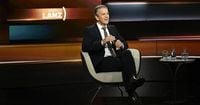On May 7, 2025, the popular talk show "Markus Lanz" aired a politically charged episode featuring prominent guests including Martin Huber from the Christian Social Union (CSU) and Franziska Brantner from the Greens. The discussion revolved around the recent election of Friedrich Merz as Chancellor, the new Black-Red coalition government, and the implications of migration policy in Germany.
The episode, which aired at midnight on ZDF, was significant as it reflected the ongoing tensions in German politics following the controversial Chancellor election. Merz, who was elected in a dramatic second ballot after failing to secure enough votes in the first round, has faced criticism for his party's handling of issues related to the Alternative for Germany (AfD) and the Left Party. Huber, as CSU General Secretary, defended his party's approach, emphasizing the Union's commitment to tighten migration policies once they assume full control of the government.
Brantner, the co-leader of the Greens, provided a counterpoint by assessing the economic plans of the new coalition, which has been met with skepticism from her party. She highlighted the Greens' role as the primary opposition party and expressed the need for constructive resistance against the government's policies, particularly concerning environmental regulations and social spending cuts.
During the show, Huber addressed the accusations that the Union's rhetoric on migration might inadvertently bolster the AfD's position. He argued, "In three years of the traffic light coalition, the AfD has doubled. This is a challenge we all face together." This statement sparked a debate about the direction of political discourse in Germany and the potential consequences of hardline stances on migration.
Brantner responded with her own critiques, stating, "You have demonized us for weeks, months, and blamed us for every problem!" She emphasized that the current political climate should foster collaboration rather than division, urging Huber to adopt a more humble approach in their discussions.
The episode also touched on the broader context of the new coalition's formation and the implications of the AfD being classified as a "confirmed right-wing extremist" party by the Federal Office for the Protection of the Constitution. This classification has raised concerns about the normalization of extremist views within German politics.
As the conversation unfolded, both guests exhibited a mix of tension and humor, with Lanz often interjecting to lighten the mood. At one point, he remarked on Brantner's assertion that the Greens had "saved" Merz for the second time since entering opposition, which elicited laughter from the audience and underscored the absurdity of the political situation.
Looking ahead, the show provided information about its upcoming episodes, indicating that Lanz's discussions will continue to focus on pressing national issues. The next broadcasts are scheduled for May 8 and May 13, 2025, with similar late-night airings aimed at engaging viewers on political matters.
Markus Lanz's show has become a staple of German television since its debut in 2008, attracting audiences with its mix of political commentary and guest interviews. The program has seen a rise in viewership, achieving a market share of 15.2 percent last year, up from 14.3 percent in 2024. In the ZDFmediathek, the show has also recorded a new high, with 3.0 percent of all on-demand video views attributed to it.
As Germany grapples with its political landscape, Lanz's platform continues to provide a space for dialogue and debate, reflecting the diverse perspectives within the country's political spectrum. With the challenges posed by the new coalition and the ongoing issues surrounding migration and extremism, future episodes promise to be just as engaging and contentious as this one.





